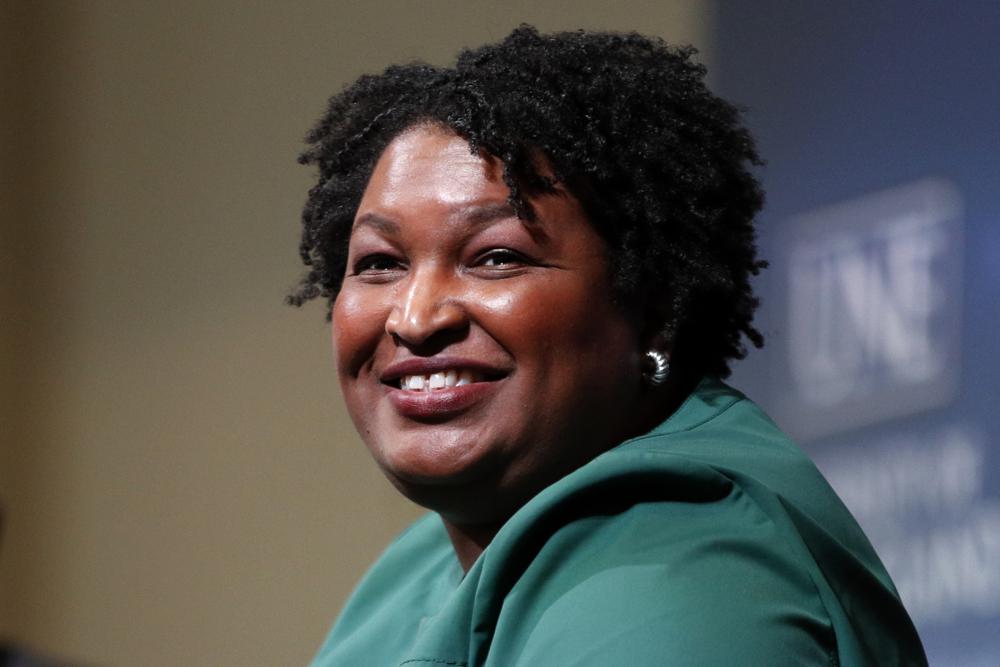Stacey Abrams evokes ‘Trust Black Women’ with new book ‘While Justice Sleeps’
OPINION: Political star Stacey Abrams' new legal thriller is not so much ripped from the headlines as it is the stuff of our most vivid nightmares

A literary roller coaster with social insight
With all the talk about landmark Supreme Court decisions in jeopardy, retirements, nominations and their consequences, Stacey Abrams’ new legal thriller While Justice Sleeps is not so much ripped from the headlines as it is the stuff of our most vivid nightmares. When cantankerous Supreme Court justice Howard Wynn slips into a coma, it propels the court into limbo, causing a constitutional crisis with his law clerk at the center of a political storm.
It’s a brilliant premise because the stakes couldn’t be higher. As long as Wynn holds on, no replacement can be appointed. That thwarts the plans of the current president whose politics are antithetical to Justice Wynn and calls the future of every case before the court into question.

Making his (young, African American, female) law clerk his custodian substantially ratchets up the drama. The prickly Wynn has a long estranged son and soon to be ex-wife, who seems eager to pull the plug and create an opening on the court. Knowing this, before his latest medical crisis, with his health and mind in jeopardy, Wynn drafted advance instructions giving Avery Keene his power of attorney and designating her as his legal guardian and sole arbiter of his care.
All of a sudden, an unassuming person from the wrong side of every town she’s lived in holds one of the most powerful positions in the country by proxy. In a way, this complex, sometimes veering on convoluted plot reads like a play on the mantra of “trust Black women” — it hinges on a Supreme Court justice trusting/burdening one Black woman who works for him to protect his life and in doing so save the day for many others. Based on how things unfold, the country may say trust Black women, but Avery’s experiences clearly reveal the idea to be a farce.
Former Georgia gubernatorial candidate, attorney and voting rights advocate Stacey Abrams knows this terrain — legal, social, and political— inside and out. With that expertise, the issues at the center of the story are drawn with precision and insight, but her characters are the book’s greatest strength.
Read More: Stacey Abrams signs deal for 2 more political thriller novels

The story is anchored by two indelible outsiders who have little in common save the institution for which both work and their prickly personas. Supreme Court clerk Avery Keene is an African American woman who’s worked her way up from challenging circumstances — despite a formidable intellect and the tenacity of a bulldog, her rise was never foretold. With an adored African American dad who died when she was young and a volatile, White drug-addicted mother on whom she could never rely, Avery learned to be resourceful and self-reliant early on.
The second lead — Justice Wynn himself — is riddled with intriguing contradictions. A brilliant rebel, a “libertarian hippie,” and cantankerous institutionalist, he spends most of the novel incapacitated, yet never really relinquishes control. He had always been a hellraiser, but of late, suffering from a degenerative disease that affects his mind, he grew paranoid and erratic too.
From Avery’s perspective he’s “Smart. Brusque. Caustic.” At times though, in recent flashbacks, the venerable Wynn sounds like every tin foil-hatted conspiracy theorist you’ve ever seen in a novel or on the screen. Prone to cutting remarks and hyperbolic, long-winded harangues, Wynn is the epitome of a character who’s paranoid, and yet not necessarily wrong. That’s especially true when he accuses his nurse of plotting to kill him.
“You believe I would kill you?” she asks. His response? “Nothing so bold and direct. You simply write down your observations and pass them along, in violation of medical privilege, building their case against me.” He also assumed in his health situation he’d be under constant surveillance:
“I assume they make you report on my impending demise on a regular basis. Probably have you reading my papers at night, snapping photos so they know what I’m doing. Would love to have you tape me, but their surveillance can’t get inside. That interloper in the White House is afraid I’m going to crush his dreams, and they sent you to keep tabs on me. My speech today must have him cursing my name.”
But is that really so far-fetched? Everyone has an agenda and it makes sense that people are really out to get him! One case before the Supreme Court in particular, involving a proposed international biotech merger opposed by the president, has billions of dollars and countless lives riding on it. With those stakes, some in his theoretical inner circle and in the higher reaches of government, are motivated to protect him; others would love it if he never saw another day.

So with a mind that’s increasingly unreliable but still cunning, Howard Wynn left a trail of crumbs for the one person he trusts — a woman he knows only professionally and barely at that — enlisting her not just as his custodian but also as his surrogate, body and mind. Wynn is counting on Avery to complete an investigation which has the potential to rock the world. What he’s counting on: “Ms. Keene is a smart girl. Very smart,” though he’s quick to say that she’s also “preoccupied with proving herself” and in possession of a brain that she only “occasionally puts to use.” She’d have been a far better thinker, perhaps even “brilliant,” he believes, “if she were a more precise thinker” and if she’d had better tutors to guide her. And, in a way, Judge Wynn has set himself up as that invisible tutor.
Those, however, are just the bare bones of the story, and this is not a spare tale. Stacey Abrams’s thriller is an intricate one with a diverse supporting cast of allies and adversaries and a Russian nesting doll of legal maneuvering, politics and technological intrigue. Much of it is riveting.
There are also subplots and clever details strewn like Easter eggs throughout. Somewhere in the middle, the plot starts to feel overstuffed, and the myriad of moving parts slow forward momentum.
But after hearing the unrelenting drumbeat of “trust Black women” for the past few years, there’s something deliciously rewarding about a thriller that realistically and unflinchingly reckons with how a young Black woman like Avery Keene gets treated when she answers the call to serve.
Judge Keene may put his faith in Avery but the rest of the country? Whether assumed to be a hustler, seductress, jezebel or simply out of her depth, Avery’s identity is always in play, and Abrams is particularly deft at managing those nuances and implications. It’s a literary roller coaster ride with unique social insights built in.

Dr. Carole V. Bell is a Jamaican-born writer, researcher, and media and political communication scholar whose work focuses on public opinion and the politics of entertainment. An enthusiastic Tar Heel, Carole earned a Ph.D. in Political Communication from the UNC-Chapel Hill School of Journalism and Media, a Masters in Television and Radio from Brooklyn College, and a B.A. from Harvard University.
Have you subscribed to theGrio’s “Dear Culture” podcast? Download our newest episodes now!
TheGrio is now on Apple TV, Amazon Fire and Roku. Download theGrio.com today!









